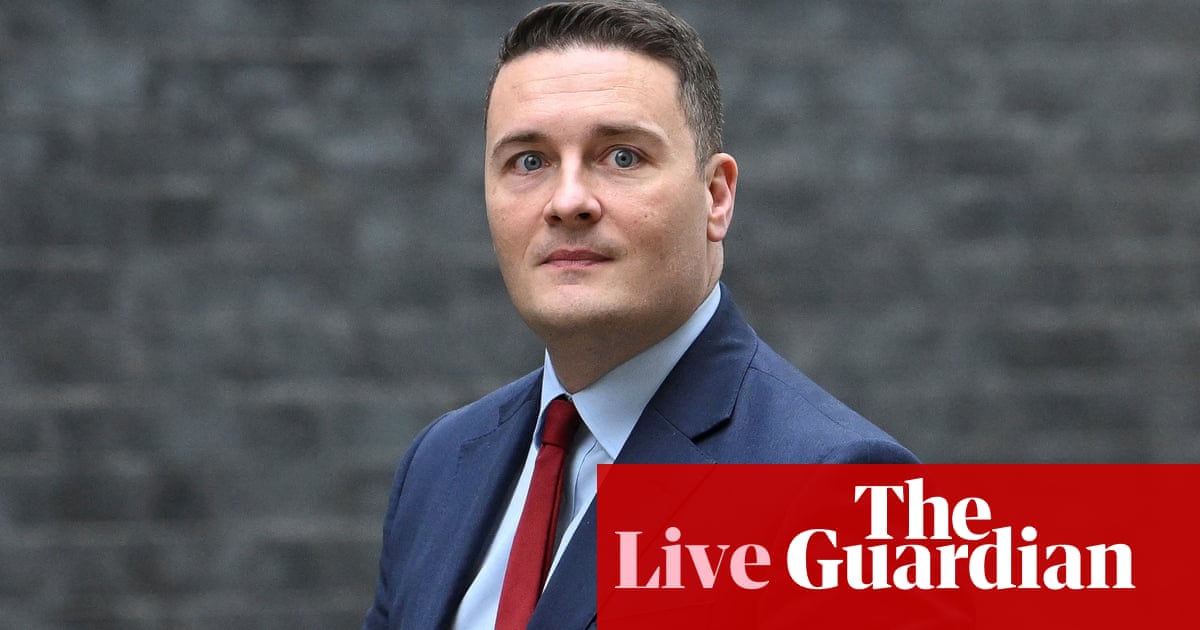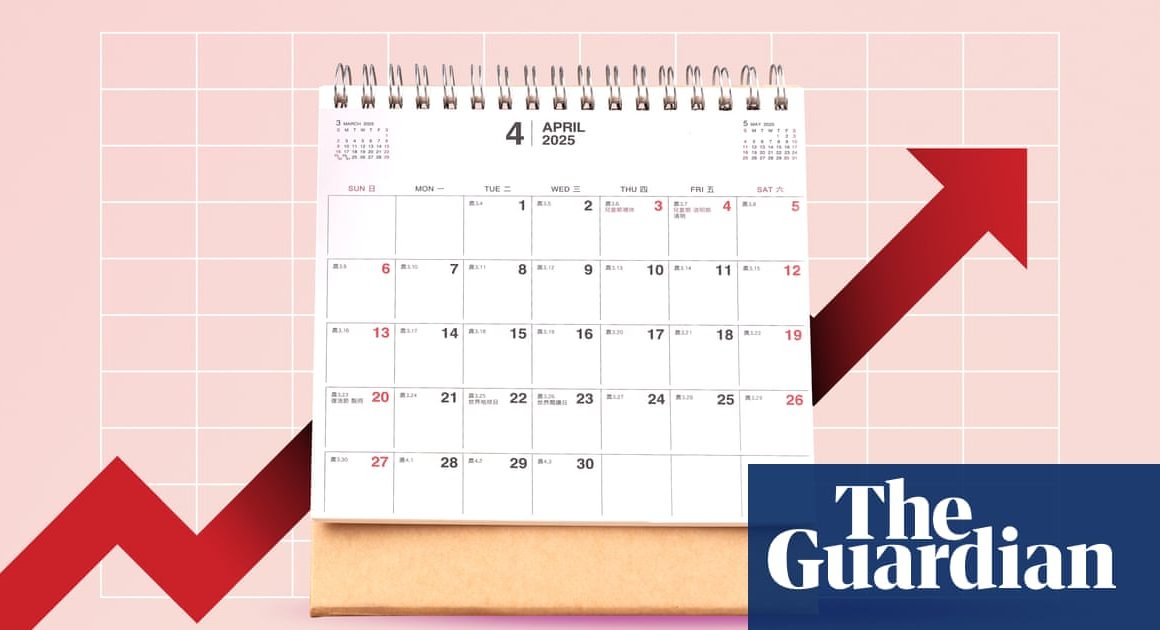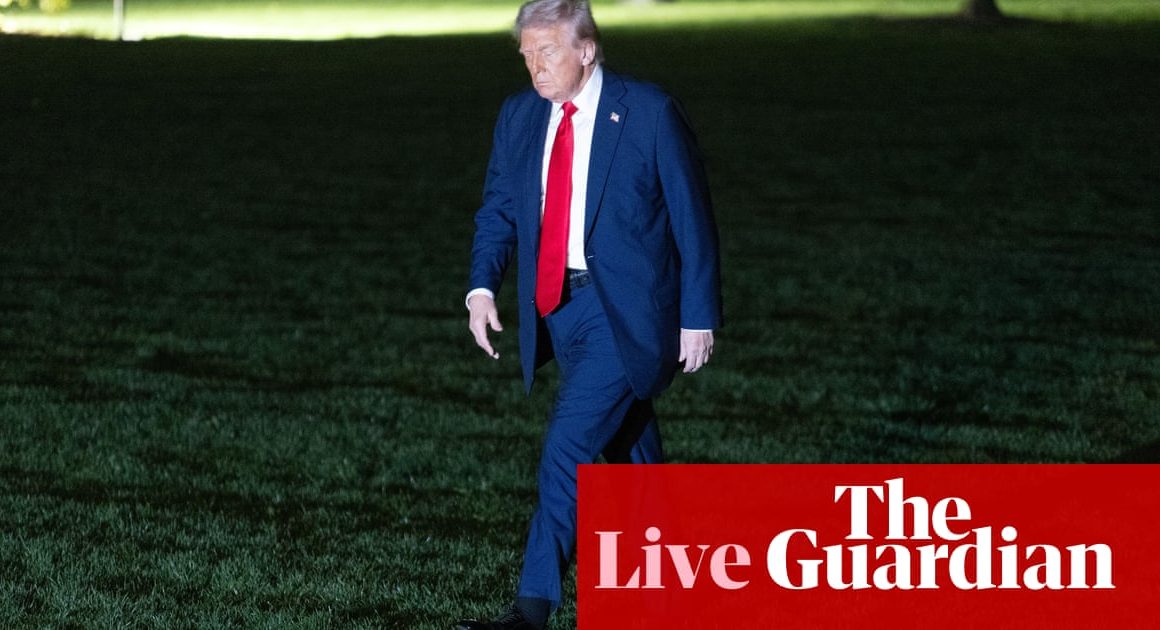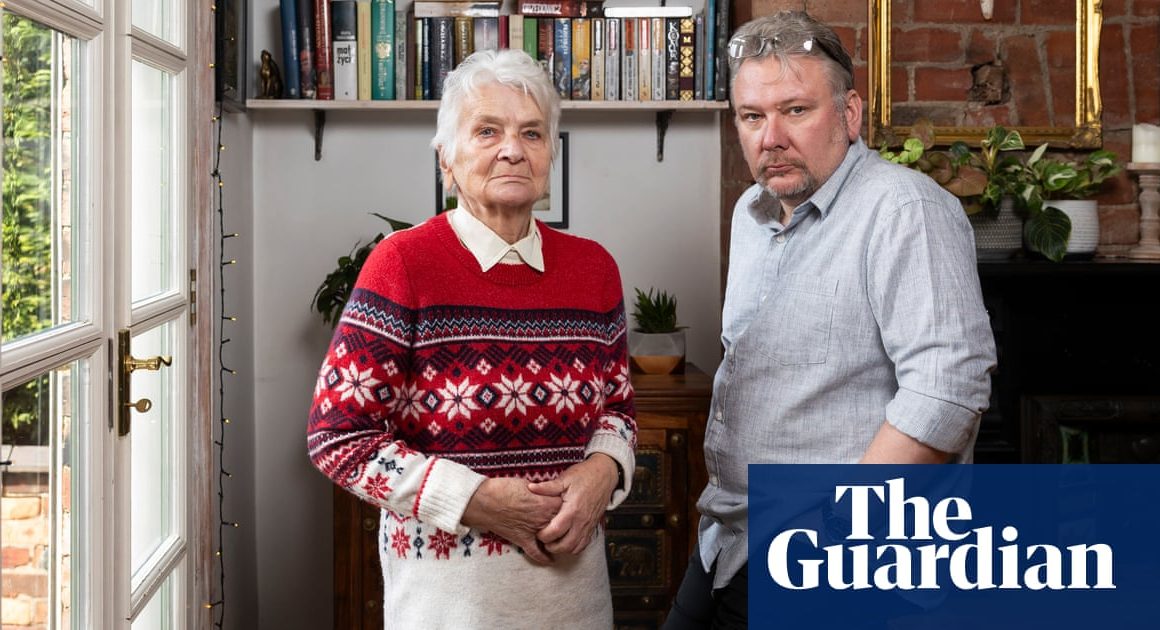Streeting: ‘hell of a lot more to do’ on improving NHS care in England
Despite the announcement that the government claims to have hit its target of two million extra appointments, health secretary Wes Streeting has said there is “a hell of a lot more to do” to improve NHS care in England.
Speaking on the BBC Radio 4 Today programme, the MP for Ilford North said:
What we’ve seen in the NHS over the course of winter with ambulance response times, and corridor care, [there’s] a hell of a lot more to do there. Mental health is in a dire state. There’s a huge amount more to do there.
And on each of those fronts, of course, we are going to deliver what we said in our manifesto.
But it’s important that as we do, we’re reporting back to reassure the public that politics can make a difference. That government can be a force for good.
Key events
Badenoch: ‘Our country is not racist’ but ‘some cultures are better than others’ and ‘British people must come first’
Conservative opposition leader Kemi Badenoch has asserted that “our country is not racist” but that “some cultures are better than others” in part of a speech in London where she said “immigration is far too high” and that minds are being “poisoned” in higher education institutions in the UK. She said “British people must come first”.
Speaking at the Alliance for Responsible Citizenship (ARC) conference, which is also expecting to hear from Reform UK leader Nigel Farage, Badenoch said:
A country cannot be successful if its people and its intellectual elite don’t believe in it. This means dealing with the poisoning of minds happening in higher education.
We have been naive on economic growth. We have been naive on issues from net zero to immigration, weakening ourselves and strengthening our competitors.
Immigration is far too high. We cannot support all those who wish to come to our country. We have no obligation to do so. The British people must come first.
We cannot keep racking up debt for our children, It was fiscal weakness, not just war, that led to the decline of the Roman Empire. We need smaller government and smarter spending. The belief that the state and not business creates wealth has become normalised.
The world owes no one a living. Millions of people cannot just sit on welfare and expect to be paid to do so, and if they don’t like it, that’s their problem, not the state’s.
Our country is not racist. We don’t need to apologise. We don’t need to pay reparations or give away the Chagos islands.
Free speech matters. Some cultures are better than others, and it’s only contentious to say this because honesty has become impossible.
Most of all, we need to get up off our knees and start fighting not just for the UK, but for the west and our values.
Badenoch implored the audience “Don’t listen to the media class complain about populism. The very essence of democracy is acknowledging the will of everyday people and then actually making it happen.”
Speaking of her own mission as the new leader of the Conservatives, Badenoch said:
For those of us who seek leadership, we must do better, and that is why in the UK, my party is starting the largest renewal of policy and ideas in a generation.
This conference is part of finding those answers, and it fills me with hope.
If we get this right, we stand at the dawn of a new conservative century with so much opportunity and possibility.
If we throw this opportunity away, because of anger, or self doubt, or weakness, our country and all of western civilisation will be lost.
ARC was co-founded in 2023 by the Canadian psychologist and self-help author Jordan Peterson and the Tory peer Philippa Stroud. Financial backers include Paul Marshall, one of the owners of GB News, and the Legatum Institute libertarian thinktank. It is expected that on Tuesday as part of the conference Farage will be interviewed onstage by Peterson.
In a passage of her speech to the Alliance for Responsible Citizenship conference in London, opposition leader Kemi Badenoch has said that some immigrants to western country are working with “useful idiots” to undermine society.
She said:
Millions of people all around the world want to live in the west because they want the benefits. However, some of them bring behaviours, cultures and practices that will undermine the west and the values that helped make us great. They find common cause with our useful idiots who don’t appreciate their own inheritance.
Badenoch: Starmer took knee for BLM protests because he was ‘cowed by the mob’
Kemi Badenoch has accused the prime minister of taking the knee as part of Black Lives Matter protests because he was “cowed by the mob”.
Speaking at the Alliance for Responsible Citizenship conference in London, in a passage in which she praised Michaela Community School headteacher Katharine Birbalsingh for refusing to provide prayer spaces or allowing prayer to take place in the school’s secular environment, the Conservative opposition leader said:
Katharine showed how you defend Western civilisation. Contrast this courage with Keir Starmer, the prime minister who took the knee during Black Lives Matter protests in response to a problem that was not in his country and did not apply. Why? Because he was cowed by the mob. The problem isn’t liberalism. The problem is weakness.
Earlier in the speech Badenoch praised what she described as the classical liberal values of free speech and freedom of religion.
Badenoch also took a swipe at the prime minister over defence spending, saying:
Totalitarian states like Russia, Iran and North Korea are coordinated in their efforts. Failing to spend more on defence is not peacemaking, it is weakness, and it only emboldens their threats to democracy and global stability.
After 14 years of Conservatives in government, defence spending in real terms in 2023/24 was £53.9bn, lower than the £57.1bn spent in 2009/10 during the last year of the previous Labour administration.
Badenoch says ‘Western civilisation is in crisis’ during ARC conference speech
Kemi Badenoch has been speaking at the Alliance for Responsible Citizenship conference in London. The Conservative opposition leader opened her talk by saying “Western civilisation is in crisis.”
She said that a “crisis of confidence” has set in “at exactly the same time that we face existential threats.”
She said “it is not liberal values that are the problem – it is weakness.”
Citing survey results that suggest large numbers of young people in the UK are not proud to be British, and believe the country to be racist, and have little faith in parliamentary democracy and would support “a strong leader”, Badenoch said:
We should not be surprised. Young people see a parliament presiding over stagnation, despite making more and more laws. A parliament with only a few defending our values and many more too scared to challenge those who attack what we believe in.
She said:
So let’s remember what we are defending here. Not just our wealth, but our culture. A culture built on those values we’ve taken for granted. Classic liberal values. Not left-wing liberalism, but classic liberalism. Of free markets, free speech, free enterprise, freedom of religion, the presumption of innocence, the rule of law, and equality under it. No matter who you are or where you come from.
As the world becomes more complicated, we need to bravely fight for these values now.
Instead, we are distracted, too busy critiquing and deconstructing what previous generations built, rather than making sure that the very best of our inheritance is left intact for the next generation.
This is the real poison of left-wing progressivism, whether it’s pronouns or DEI or climate activism. These issues aren’t about kindness. They are about control. We have limited time and every second spent debating what a woman is, is a second lost from dealing with these challenges.
Streeting: NHS immigration impact is ‘mixed picture’ as many people come to work in health and social care
Asked about the impact of migration on NHS services while appearing on ITV’s Good Morning Britain, health secretary Wes Streeting said it was “a mixed picture”.
Suggesting that the service was “slightly over-reliant on overseas workers” he told viewers:
There’s no doubt that net migration is placing real pressure on the NHS. But it’s a mixed picture, because in those figures are also people who are coming to work in our NHS and social care services.
So we are, I think, slightly over-reliant on overseas workers to staff our health and care services. And I think it’s partly my job to help the home secretary reduce those net migration figures.
And overall, we were investing in the skills of our nation so we can train up our own people, to reduce our reliance on people coming from overseas to fill vacancies.
Streeting had been asked “What about the pressure on the NHS of immigration, legal and illegal? We see figures just this weekend, very high. Hundreds of people crossed over the weekend, and it’s February. We’re not even in spring or summer. That’s putting immense pressure on the NHS, isn’t it?”
The health secretary defended the government’s record, saying:
On the question of illegal migration, in common with other challenges across government, we’ve made progress in the first seven months, especially on deportations of people who shouldn’t be here.
And the home secretary and the prime minister have been working ferociously with our allies across Europe, particularly countries like Italy, where this is also a challenge, to start dealing with our border security issues.
And just last week, we put legislation through parliament to set up our secure border command, which, unfortunately, the Conservatives and Reform voted against. But we are making progress. And in common with what I said about the NHS, a lot done, a hell of a lot more still to do.
Keir Starmer’s announcement via the Telegraph that he was prepared to put British peacekeeping troops on the ground in Ukraine was also described by Conservative MP and shadow cabinet spokesperson Alicia Kearns as not the right priority. She told viewers of Sky News “his priority should be today talking about defence spending.”
It was put to her that by Sky’s Wilfred Frost that “you’re trying to criticise the state of defence spending six months into their government, when this is a long-term issue, after 14 years [of Conservatives being] in power.”
Kearns responded by saying:
I’ve always been very clear. I was critical of my own government. But what I’m saying is, since July, a decision was made to side with the Treasury, to not give the increase in defence spending. We needed to continue to replenish stocks. Replenishing stocks should be the priority so that we are ready if we do need to provide peacekeeping services, if we do need to provide more support to Ukraine.
Another person who raised the issue of the cost associated with Starmer’s announcement and broader defence spending was Richard Dannatt, chief of the general staff between 2006 and 2009, who told BBC Breakfast:
My reaction is the prime minister is doing the right thing. But, of course, doing the right thing comes at a price. If the prime minister is serious about wanting to deploy British troops, put boots on the ground in Ukraine as part of a peacekeeping force, he’s got to realise that’s going to come at a considerable cost.
Frankly, we haven’t got the numbers and we haven’t got the equipment to put a large force onto the ground for an extended period of time at the present moment. We’ve got to have the right number of people with the right equipment and the right training, and start to fund that now.
Conservative MP for Rutland and Stamford, Alicia Kearns, who acts as a shadow cabinet spokesperson, was also on the media round this morning, and told viewers of Sky News that while her party stood “shoulder to shoulder” with Ukraine, she was “quite cautious” about Keir Starmer’s announcement in the pages of the Telegraph that he was prepared to put British troops on the ground as part of a peacekeeping force.
She said:
I’m quite cautious, because we’re not a place in which we understand the terms or the conditions or the numbers or the way in which we’ve been deploying our people, and we should always make sure that we are making decisions based on as much information as possible.
The reality is that Ukraine is still fighting for its freedom. Russia has taken around 600 square miles of territory over the last few months. We’re not in a place as yet where I think we can be making those commitments … things are going to change over the next few hours, let alone the next few days, weeks and months.
I’m used to seeing what it’s like out where we have people deployed. I don’t like to deal in hypotheticals when it comes to putting our men and women on the ground, fighting for people, because I’ve seen how dangerous it can be on the ground and how important those decisions are.
On the prospects of a US-Russia brokered peace deal without including Ukraine or European voices in negotiations, Kearns said:
We will always give Ukraine the support they need. We will stand shoulder to shoulder with them. We will fight for them to determine the terms of this peace.
And also, it’s important to note, this can’t just be that we’ve managed to stop the shooting and murder, and therefore we’ve got peace. We need a peace deal that will end the threat to our European neighbours and to us, one that will make us safer from a state that is currently behaving like a terrorist.

Denis Campbell
While health secretary Wes Streeting has been doing the media round boasting about making progress on the NHS in England, my colleague Denis Campbell has this report stating that NHS patients in England are affected by dysfunctional admin. He writes:
Patients routinely have to chase up test results, receive appointment letters after their appointments and do not know when their treatment will occur because the NHS is so “dysfunctional”.
That is the conclusion of research by two major patients’ organisations and the King’s Fund, which lays bare a host of problems with the way the health service interacts with it users.
Sixty-four percent of people in England who used the NHS or arranged care for someone else over the last year encountered a problem involving its administration or communication.
Patients were left frustrated by test results going missing, being unable to change or cancel appointments or having to pursue the results of a test, scan or X-ray.
You can read more of Denis Campbell’s report here: Most NHS users in England affected by dysfunctional admin, report finds
Streeting: I hope NHS appointment achievement in England will help rebuild ‘shattered confidence’ in politicians keeping promises
The health secretary has said that he hopes the government’s announcement on additional NHS appointments in England will go some way to rebuilding the “shattered confidence” in politicians keeping their promises.
Appearing on ITV’s Good Morning Britain, Wes Streeting told viewers:
I want to say two things really. The first is that we have delivered that first step. We promise to deliver two million more appointments a year to cut NHS waiting lists [in England], and we’ve done it seven months early.
So for all those people out there watching, and there will be many, who think that politicians talk a lot and do very little, and that politicians don’t stick to our promises, I hope this starts to rebuild your shattered confidence that we are sticking to our promises. So that’s the first point.
The second point, though, I’m not doing victory laps. The prime minister isn’t doing victory laps. We know there’s a hell of a lot more to do … whether it is the size of the waiting lists, the ambulance response times, the people on trolleys in corridors, or the struggle people have to get a GP or a dentist appointment. There are enormous challenges in the NHS.
We’ve hit the ground running. We are attacking those challenges and seeking to deliver year on year improvement. But you won’t hear us today going around saying, don’t worry. Job done. What we are saying today is we’ve delivered our first step.
So a lot done, but a hell of a lot more to do. And I hope it just rebuilds a bit of confidence that we are delivering our promises and that things will get better and brighter.
The government has announced that it has hit an election promise to deliver more NHS appoints in England. In a statement it claimed “Pledge to deliver over two million more elective care appointments hit early with over 100,000 more treatments, tests and scans for patients each week” and that “Waiting lists falls by almost 160,000 since government took office, as extra appointments delivered for chemotherapy, radiotherapy, endoscopy, and diagnostic tests.”
Streeting: Ukraine peace deal is ‘existential question for Europe as a whole’
Health secretary Wes Streeting has been on the media round for the government this morning, and has been asked about Keir Starmer’s commitment to put British troops on the ground in Ukraine in a peacekeeping role if required by any peace deal.
Speaking on Times Radio he said it was “premature” to talk about how many British troops could be sent. PA Media reports he told listeners:
The prime minister will be travelling to France to meet with other European Nato leaders to discuss what is a once-in-a-generation moment for the collective security of our continent, which isn’t just about the future of Ukraine, it is an existential question for Europe as a whole.
That’s why the gathering [in Paris] today is important. Next week, he’ll be travelling to Washington to meet with President Trump, no doubt relaying the outcome of some of those discussions today.
Asked what the scale of a potential peacekeeping force could be and if the Government would be prepared to carry out a recruitment drive, he said: “I think it’s premature to be talking about numbers.”
He said the government was still “on the path” to spending 2.5% of GDP on defence, although the government does not have a date for reaching the target.
According to House of Commons library figures, in the 2023/24 financial year, the UK spent £53.9bn on defence. A report published in December 2024 stated that “Real-terms defence spending fell by 22% between 2009/10 and 2016/17 (from £57.1bn to £44.6bn in 2023/24 prices), before starting to increase again to nearer its 2010 levels.”
Starmer: ‘ready and willing’ to put British peacekeeping troops on the ground in Ukraine
Keir Starmer has said he is prepared to put British troops on the ground in Ukraine in a peacekeeping role as part of any peace deal.
Taking the unusual step of announcing the potential deployment of British troops in the pages of the Telegraph rather than in parliament, the prime minister said:
Europe must step up further to meet the demands of its own security. We have got to show we are truly serious about our own defence and bearing our own burden. We have talked about it for too long – and president Trump is right to demand that we get on with it.
Russia is still waging war and Ukraine is still fighting for its freedom, which is why we must not relent in our efforts to get the kit Ukrainians need for their fighters on the front line. While the fighting continues, we must put Ukraine in the strongest possible position ahead of any talks.
The UK is ready to play a leading role in accelerating work on security guarantees for Ukraine. This includes further support for Ukraine’s military. But it also means being ready and willing to contribute to security guarantees to Ukraine by putting our own troops on the ground if necessary.
I do not say that lightly. I feel very deeply the responsibility that comes with potentially putting British servicemen and women in harm’s way. But any role in helping to guarantee Ukraine’s security is helping to guarantee the security of our continent, and the security of this country.
Starmer continued by saying “The end of this war, when it comes, cannot merely become a temporary pause before Putin attacks again.”
The prime minister is heading to Paris today for talks with European leaders. My colleague Jakub Krupa writes:
The Paris meeting will aim to outline a European action plan after days of chaotic briefing by the Trump administration. The summit will also need to decide how to respond to a request by the US to spell out whether leaders are prepared to commit troops to a stabilisation force in the event of a ceasefire.
Confirming the Paris meeting, France’s foreign minister, Jean-Noël Barrot, told France Inter radio on Sunday: “The president will bring together the main European countries tomorrow for discussions on European security.” He said there was a wind of unity blowing through.
Health secretary Wes Streeting has said he remains open to “serious proposals” for private investment in the NHS.
Speaking on BBC Radio 4’s Today programme, Streeting said:
I certainly want more patient choice, more patient power, more patient control over where they’re seen, how they’re treated, the nature of their appointments. The NHS should be as responsive as any other organisation that we use.
I think there is a role for private investment, but the terms of those arrangements, that’s where you’ve got to tread really carefully. But I’m open to serious proposals from the NHS, or indeed anyone else.
Government claims it has delivered election pledge on NHS appointments in England early
The government has claimed that it has delivered early on an election pledge to offer an extra two million NHS appointments in England within a year.
In a statement, the government said:
The prime minister has welcomed new figures published by NHS England which reveal that between July and November last year, the NHS delivered almost 2.2 million more elective care appointments compared to the same period the previous year – delivering on the government’s mission to fix the NHS as part of the plan for change.
The new data confirms the government reached the target seven months earlier than promised – with 100,000 more treatments, tests, and scans for patients each week, and more than half a million extra diagnostic tests delivered.
Speaking to BBC Radio 4’s Today programme, health secretary Wes Streeting said: “Look at the size of the waiting lists overall. It’s come down four months in a row. That’s progress, but there’s still a lot more to do.”
NHS England provided 2.2m more appointments for planned care – including chemotherapy, radiotherapy and diagnostic tests – between July and November last year than during the same period the year before.
Streeting: ‘hell of a lot more to do’ on improving NHS care in England
Despite the announcement that the government claims to have hit its target of two million extra appointments, health secretary Wes Streeting has said there is “a hell of a lot more to do” to improve NHS care in England.
Speaking on the BBC Radio 4 Today programme, the MP for Ilford North said:
What we’ve seen in the NHS over the course of winter with ambulance response times, and corridor care, [there’s] a hell of a lot more to do there. Mental health is in a dire state. There’s a huge amount more to do there.
And on each of those fronts, of course, we are going to deliver what we said in our manifesto.
But it’s important that as we do, we’re reporting back to reassure the public that politics can make a difference. That government can be a force for good.
Welcome and open summary …
Good morning, and welcome to our rolling coverage of UK politics for Monday. Here are the headlines.
-
The government has claimed that it has already delivered on its election pledge to provide two million additional NHS elective care appointments in England
-
Health secretary Wes Streeting said there is “a hell of a lot more to do” to improve care in the NHS in England, singling out ambulance response times and corridor care as issues
-
Prime minister Keir Starmer has written an op-ed for the Telegraph saying that he is willing to put British troops on the ground as part of a peacekeeping force on the ground in Ukraine if required as part of any peace deal
-
Chancellor Rachel Reeves has been warned public sector unions will demand higher pay increases to compensate for accelerating inflation
-
UK employers are reported to be preparing for the biggest redundancy round in a decade amid collapsing business confidence as firms brace for tax increases from April
-
Britain’s poorest households are paying an increasing share of their income on council tax, according to new analysis
-
Conservative opposition leader Kemi Badenoch, and Nigel Farage, leader of Reform UK, are expected to attend the Alliance for Responsible Citizenship (ARC) conference in London
It is Martin Belam with you today. You can get in touch with me at martin.belam@theguardian.com.












